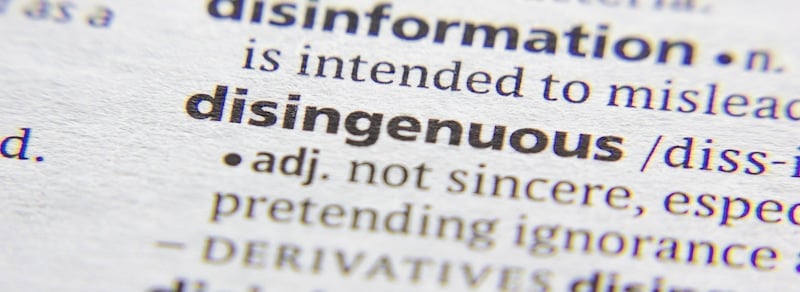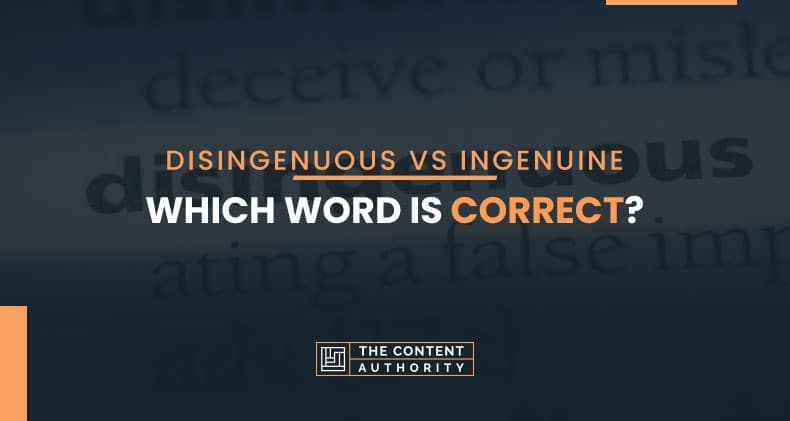English spelling has a set of words that can easily confuse the reader if we don’t stop and read where a word derives from or what it means. If you’ve come across the words “disingenuous” and “ingenuine,” you may have wondered which term is the correct one to use.
Disingenuous is the correct word, and ingenuine is not yet considered a word; however, a few dictionary entries contain the definition of ingenuine as “a person who is not authentic or someone who is hypocritical.” But for now, the disingenuous is the one recognized as correct.
By reading below, you’ll learn the difference between “disingenuous” and “ingenuine” and how to use them in different sentences.
Definitions
Disingenuous: Adj. Disingenuous means lacking sincerity or truth; someone who is fake or deceptive. Insincere. Dishonest. Someone who pretends to know less than what he actually knows or someone who is hypocritically ingenuous.
We can find the word “disingenuous” mostly in political and legal contexts.
Ingenuine: Adj. Although it is not yet considered a word, it can be found in online dictionaries as “someone who is not genuine or authentic” or “someone who is false.” Some people may mistake it for an actual word as there are other words with similar spelling such as ingenuity, ingenious, etc. The similarity in spelling could be the reason that many people mistake this word, even when their meaning is nothing alike since ingenuine doesn’t share meanings with ingenuity or ingenuous.

How To Properly Use “Disingenuous” In A Sentence:
Disingenuous is commonly used to describe the opposite of “genuine,” although people might attempt to use “ingenuine” as it is normal to add the prefix -in or -un when trying to depict the antonym of a word. “Ingenuine” is not synonymous with disingenuous and should never be used as an antonym of genuine.
Synonymous Of The Word “Disingenuous”
- Hypocritical
- Insincere
- Uncandid
- Deceitful
- Dishonest
- False
- Sly
- Fake
- Deceptive
- Cunning
- Mendacious
- Feigned
- Calculating
When trying to use them as antonyms of the word “genuine,” it’s best to stick with “disingenuous” as it won’t throw any spelling errors as opposed to “ingenuine.” It’s also equally important to avoid this word in spoken English. There won’t be any spelling errors, but we won’t sound fluent or knowledgeable. In addition, it will likely be troublesome for some non-English speakers to understand, as many usually rely on dictionaries when they don’t understand a word.
“Disingenuous” Antonyms
- Candid
- Ingenuous
- Frank
- Honest
- Trustworthy
- Truthful
- Sincere
Examples Of The Word “Disingenuous”
- The hiring manager would rather recommend someone with honest confusions than someone with disingenuous beliefs.
- Their claim towards those issues seemed to be blatant and disingenuous.
- His excuse was incredibly disingenuous and was even frowned upon.
- The journalist was being disingenuous and negative when asked about the report.
- Their inheritance was destroyed and disowned by the disingenuous attitude of the state.
- The evidence provided proved to be not only theoretically disingenuous but false in material respects.
- This is disingenuous in the extreme if you ask anyone with the ability to reason.
- My proposal, although disingenuous, was extremely successful and caught the donors’ attention.
- Because the public perceived the last politician’s speech as disingenuous, they did not vote for him and removed him from the chain of command.
- The previous detective carried the trait of being a disingenuous man who used to trick others into confessing.
- Although the politician had promised to be open and honest during the election, he later became disingenuous and hid important facts from the voters.
- Many people out there are disingenuous and try to hide their true intentions from others.
- It would be disingenuous to assume that everything in a reduced world will be comfortable to accept.
- She gave them a disingenuous response.
- My old mate found his boss’s compliments a little disingenuous.
- I think the company’s new CEO is disingenuous, but I’m worried that my remarks might jeopardize my promotion.
- The reason behind his objection in court seemed a little disingenuous and like he was trying to stall the trial.
- It is disingenuous to even consider publishing this document on the grounds that “Citizens can make up their own minds.”

As we can see, we can replace the previous sentences with the previously mentioned synonymous, and they will still mean the same thing:
- The hiring manager would rather recommend someone with honest confusion than someone with hypocritical beliefs.
- Their claim towards those issues seemed to be blatant and fake.
- His excuse was incredibly fake and was even frowned upon.
- The journalist was being deceptive and negative when asked about the report.
- Their inheritance was destroyed and disowned by the dishonest attitude of the state.
- The evidence provided proved to be not only theoretically mendacious but false in material respects.
- This is false in the extreme if you ask anyone with the ability to reason.
- My proposal, although deceitful, was extremely successful and caught the donors’ attention.
- Because the public perceived the last politician’s speech as uncandid, they did not vote for him and removed him from the chain of command.
- The previous detective carried the trait of being a cunning man who used to trick others into confessing.
- Although the politician had promised to be open and honest during the election, he later became sly and hid important facts from the voters.
- Many people out there are insincere and try to hide their true intentions from others.
- It would be deceptive to assume that everything in a reduced world will be comfortable to accept.
- She gave them a calculating response.
- My old mate found his boss’s compliments a little feigned.
- I think the company’s new CEO is being dishonest, but I’m worried that my remarks might jeopardize my promotion.
- The reason behind his objection in court seemed a little sly and like he was trying to stall the trial.
- It is deceptive to even consider publishing this document on the grounds that ‘Citizens can make up their own minds.
More Great Word Vs Word Posts
If we want to acknowledge someone who is not being authentic, instead of using “Ingenuine,” we should use the word “Disingenuous.”
The word “Ingenuine” is widely used all over the internet despite not being classified as an actual word in major dictionaries. We can even find this word in different contexts such as books, essays, etc. One particular use of this word is in the book “Counseling and Psychotherapy Theories in Context and Practice”:
“Adler is marvelously engaged with his client. He has thought through the typical responses and is acting with the client ─ as in a “game.” Although you might make the case that he is being ‘ingenuine‘ during this exchange, you can also make the opposite argument.”
We see many words online that people tend to use unwittingly, mostly in informal writing because we are just trying to get the point across, and we don’t have anyone revising them; for this reason, whenever we encounter a word whose meaning we do not recognize or do not grasp, there are many dictionaries that not only provide meaning but also show the word in context and provide different examples for everyone to understand clearly, thus putting a stop to the spread of misused words.
Conclusion
Knowing the difference between certain words, even those infrequently used, comes in handy when communicating with others. “Disingenuous” is defined as “someone who is insincere,” and “Ingenuine” refers to someone “who is not being authentic”; It’s not an actual word and thus should not be used. Keep in mind that when confusion arises, it’s always recommended to consult a well-known dictionary.
Shawn Manaher is the founder and CEO of The Content Authority. He’s one part content manager, one part writing ninja organizer, and two parts leader of top content creators. You don’t even want to know what he calls pancakes.

